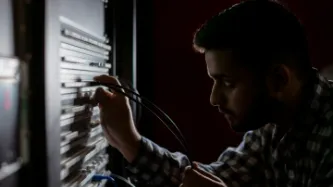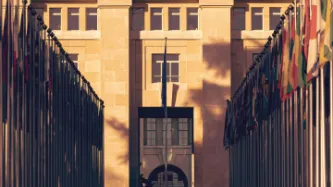Search
Content type: Examples
In May 2024 three men were charged in London with gathering intelligence for Hong Kong and forcing entry into a residence in Britain. One of them was found soon afterwards dead in a park while out on bail. The arrests raised awareness of the concerns of Hong Kong activists who have moved to London but find that they are still under surveillance from China. For some, Hong Kong authorities have offered a $128,000 bounty for information leading to their arrest. https://www.nytimes.com/2024/05…
Content type: Examples
Eighteen hours after Columbia University's Hamilton Hall students occupied a building as part of a pro-Palestine protest, police moved in, arrested dozens of people on charges of burglary and trespassing, and removed the encampments. The administration gave the students, whose primary demand was that the university divest from companies supporting Israel's government and military, ten minutes to agree to leave immediately in return for the university's promise to review their divestment…
Content type: Examples
Facial recognition is changing the nature of protest, as participants wear keffiyehs and face masks in order to hide their identities from the video cameras ubiquitous on university campuses. Student protesters have long asked schools not to use facial recognition on campus because of the damage being identified can do to those who are caught by it, even if they are misidentified or the protests were peaceful. This is especially in cases where the university calls in local law enforcement to…
Content type: Examples
In moves compared to the McCarthy era of "reds under the bed" censorship, US counter-terrorism authorities often investigate political speech at borders and elsewhere. Both major political parties have a long history of conflating activism in favour of Palestinian rights with terrorism. https://www.theguardian.com/commentisfree/article/2024/may/22/surveillance-pro-palestine-protestPublication: The GuardianWriter: Chip GibbonsPublication date: 2024-05-22
Content type: Examples
Workers at a St Peters, Missouri Amazon warehouse have filed an unfair labour practice charge with the US National Labor Relations Board alleging that Amazon has interfered with employees' right to unionise by intrusively surveilling them. Constant video and audio recording analysed by AI enables the company to discipline hundreds of thousands of workers and making it hard for them to talk to each other about working conditions, injuries, and other issues. In Europe, more than 20 labour…
Content type: Examples
Documents released under the Connecticut Freedom of Information Act show that as pro-Palestine protests have escalated, Yale has in tandem increased its tactics for monitoring student dissent. Among them: the police have surveilled student social media accounts, sent administrators to rallies, and the university has coordinated with local and state law enforcement. Forty-seven students were arrested in April 2024, and Yale has been caught in Congressional investigations into antisemitism…
Content type: Examples
An international student in Sydney, Australia, who has participated in demonstrations criticising the Chinese Community Party reports that his parents in China have been threatened by police and that the social media accounts he uses to communicate with friends and family back home have been abruptly banned. Amnesty International finds that this transnational repression is part of a pattern that spans Europe, the US, and Canada. A Chinese Foreign Ministry spokesman calls the Amnesty report "…
Content type: Examples
After the US Supreme Court's Dobbs decision overturning Roe v Wade leaked in 2022, the social media monitoring company Dataminr sent regular alerts to the US Marshals Service with times and places of pending pro-choice protests and rallies and many other protests. As a partner of Twitter, Dataminr has full access to its firehouse of postings. Among those sent to the Marshals are many innocuous postings that are clearly protected by the First Amendment. Both Twitter and Dataminr deny that…
Content type: Examples
Analysis of 700,000 documents obtained in a public records lawsuit show that the Washington, DC Metropolitan Police Department in collaboration with federal law enforcement characterised racial justice protesters and activists in 2020 and 2021 as threats based on information gathered from social media platforms and mass email chains. Widescale monitoring of social media blurs the line between monitoring for genuine public safety threats and scrutinising speech and assembly rights protected…
Content type: Examples
US states are turning to obscure laws banning masks in public, typically passed in the 1940s and 1950s in response to the rise of the Ku Klux Klan, to target people wearing face coverings while protesting the war in Gaza. In Ohio, the attorney general warned the state's 14 public universities that protesters wearing masks could be charged with a felony, in North Carolina arrested student protesters were charged with wearing masks in public, and the University of Texas at Austin withdrew…
Content type: Examples
A new report finds that Chinese and Hong Kong authorities are retaliating against Chinese student activists in Europe and North America in numerous ways: they are being surveilled both online and offline, and their families in China are being threatened by local police. The 32 students interviewed say that as a result they are afraid on their university campuses, spread across eight countries. Amnesty International calls these efforts "a strategy to curb students' human rights wherever…
Content type: Examples
Police set up cameras pointing directly at the pro-Palestine encampment at the University of Toronto's King's College Circle, leading protesters to claim they are solely for the purpose of monitoring them. Both police and the university denied that new surveillance had been put in placce.https://toronto.citynews.ca/2024/05/11/u-of-t-encampment-organizers-raise-concerns-about-illegal-surveillance/Publication: Toronto City NewsWriter: Tina Yazdani and John MarchesanPublication date: 2024-05-11
Content type: Examples
In the controversy-filled leadup to the Eurovision final, Swedish authorities set up one of the country's largest-ever security efforts. They constructed a fence around the Malmö Arena and sent up drones to patrol the city with cameras. Police, who usually carry handguns, were equipped with heavier weapons, and the arena banned bags and Palestinian symbols and required airport-style security gates, scanners, and searches. https://metro.co.uk/2024/05/08/eurovision-tensions-hit-fever-pitch-…
Content type: Examples
At a trans rights protest in October 2023, campus security told students occupying a lecture theater at Edinburgh University that they would use the Eduroam wifi to identify them. The university says it has never used wifi data this way, and its security team denies threatening students. However, a FOI requests shows the wifi data can identify users, even after the fact, and may be used in "exceptional circumstances". https://theferret.scot/edinburgh-university-denies-surveillance-claims/…
Content type: Examples
Based on documents released in response to a FOIA request, the Federa Protective Service, a law enforcement agency within the US Department of Homeland Security that monitors nearly 10,000 government facilities, warned officials that increasingly widespread pro-Palestinian protests could attract white supremacists and "racially motivated violent extremists" and become violent. Analysts base these warnings on raw data gathered by mining posts to social media and Internet message boards using…
Content type: Examples
Those wishing to reform Section 702 of the Foreign Intelligence Surveillance Act, due for renewal in April 2024, frequently cited abuses of the law to spy on protesters within the US. Nonetheless, the law was reauthorised with new and expanded surveillance powers that could expand warrantless surveillance onto US campuses. Among signatories on a letter urging Congress to reauthorise were numerous American Jewish and pro-Israel organisations citing foreign threats inside the US. An amendment…
Content type: Examples
Documents obtained under a FOIA request show that Washington, DC police have for years used online surveillance tools to monitor social media activity, collect data on individual users and their social graphs, and monitor public protests. The police departments using these techniques offer little transparency. The documents reveal, however, the claims companies like Dataminr and Voyager make in marketing their technology to police - for example, to be able to compile a list of thought leaders…
Content type: Examples
US students demonstrating over the war in Gaza wear masks and blankets to block counter-protesters from filming them or posting them images online hoping to identify them, as has happened repeatedly since the protests began. In some places, university policies or state laws ban wearing masks, even though many protesters prefer wearing masks to help avoid covid infection. https://www.theguardian.com/us-news/2024/apr/30/why-are-pro-palestinian-students-wearing-masks-campusPublication:…
Content type: Examples
Metropolitan Police used live facial recognition and attacked a crowd of trans rights campaigners, solidarity activists and anti-fascists protesting a conference on conversion therapy. Participants report being sprayed in their faces with PAVA at close range and subjected to personal physical attacks.https://netpol.org/2024/03/27/police-surveillance-and-use-of-pepper-spray-at-trans-solidarity-protest-condemned/Publication: Network for Police MonitoringWriter: NetPolPublication date: 2024-03-27
Content type: Examples
Spreading facial recognition technology - according to figures from the Carnegie Endowment for International Peace, government agencies in 78 countries use facial recognition systems - is changing the risk of participating in protests by making it impossible to count on being anonymous or in a group too large to arrest. In one example, police in Moscow reportedly use facial recognition to identify and preemptively arrest people who might be on their way to join protests. In other cases,…
Content type: Examples
Chinese students and newly graduated activists in London report that they frequently see middle-aged Chinese men at protests watching them without participating, report getting strange calls, and say their families have been threatened by local authorities in China. Experts say they may be experiencing an escalation of surveillance that previously was limited to photographs and monitoring. Many of activists are newcomers to protest and were unaware of these risks. There were more than 151,000…
Content type: Examples
The UK's political and cultural institutions are increasingly joining the police and private intelligence companies in tracking peaceful activists without transparency or accountability. The intelligence company Welund lists among its customers BP and many other oil and gas giants, as well as public authorities including the Greater London Authority. It provides them with a daily dashboard listing planned demonstrations, events, and protests that may be disruptive. https://www.…
Content type: Examples
Student protesters accused Harvard administrators of attempting to surveil and identify students participating in a vigil for 100-plus Palestinians who died under Israeli attack while awaiting humanitarian aid. Current Harvard policy prohibits classroom disruptions, and lowered tolerance for protest in general. https://www.thecrimson.com/article/2024/3/4/protesters-accuse-harvard-surveillance/Publication: Harvard CrimsonWriter: Sally E. EdwardsPublication date: 2021-03-04
Content type: Examples
Section 702 of the US Foreign Intelligence Surveillance Act, due to expire in April 2024 unless renewed, is intended to allow intelligence agencies to surveil foreigners overseas but under the rubric of "foreign influence" or "foreign intelligence gathering" can easily be abused to surveil Americans at home in response to political leaders' current obsessions. Government documents showed in 2023 that the FBI has misused S702 to search Black Lives Matter protesters' communications between 2020…
Content type: Advocacy
In January 2024, the ILO published a report, Realizing Decent Work in the Platform Economy, following a decision by the ILO Governing Body that the 2025 and 2026 International Labour Conferences would discuss standard-setting on decent work in the platform economy. The report - and the new ILO standard in development - are of interest to Privacy International because of the impacts on workers' privacy and autonomy that arise from the growing use of invasive surveillance practices and…
Content type: External content
The public register is key to addressing the information imbalance of algorithmic management by allowing workers (and candidates) and their representatives to understand what algorithms are being used and how they work. In order to do this, the register must be in accessible non-technical language and kept up to date. It must include a list of all algorithms that affect worker's treatment while at work. For each listed algorithm, the following information must be included:This is different…
Content type: Explainer
Behind every machine is a human person who makes the cogs in that machine turn - there's the developer who builds (codes) the machine, the human evaluators who assess the basic machine's performance, even the people who build the physical parts for the machine. In the case of large language models (LLMs) powering your AI systems, this 'human person' is the invisible data labellers from all over the world who are manually annotating datasets that train the machine to recognise what is the colour…
Content type: Explainer
IntroductionThe emergence of large language models (LLMs) in late 2022 has changed people’s understanding of, and interaction with, artificial intelligence (AI). New tools and products that use, or claim to use, AI can be found for almost every purpose – they can write you a novel, pretend to be your girlfriend, help you brush your teeth, take down criminals or predict the future. But LLMs and other similar forms of generative AI create risks – not just big theoretical existential ones – but…
Content type: Long Read
IntroductionFor years PI has been documenting the market dominance and associated power of Big Tech over the digital economy, and the threats this poses to our privacy and wider rights.The digital economy is characterised by a handful of Big Tech companies that have established and maintained dominance over the digital market through opaque and exploitative practices. Big Tech exploits the data of those who use their platforms in ways which interfere with our privacy and wider rights. In…
Content type: Advocacy
In an increasingly digitised world, automation, artificial intelligence and sensitive data processing present new and rapidly shifting challenges which underscore the urgent need for states to ensure that the rights of persons with disabilities are explicitly addressed and centred when it comes to the use of data and technology. Digital technologies can offer important opportunities for accessibility and the realisation of human rights of persons with disabilities, but can also present…




